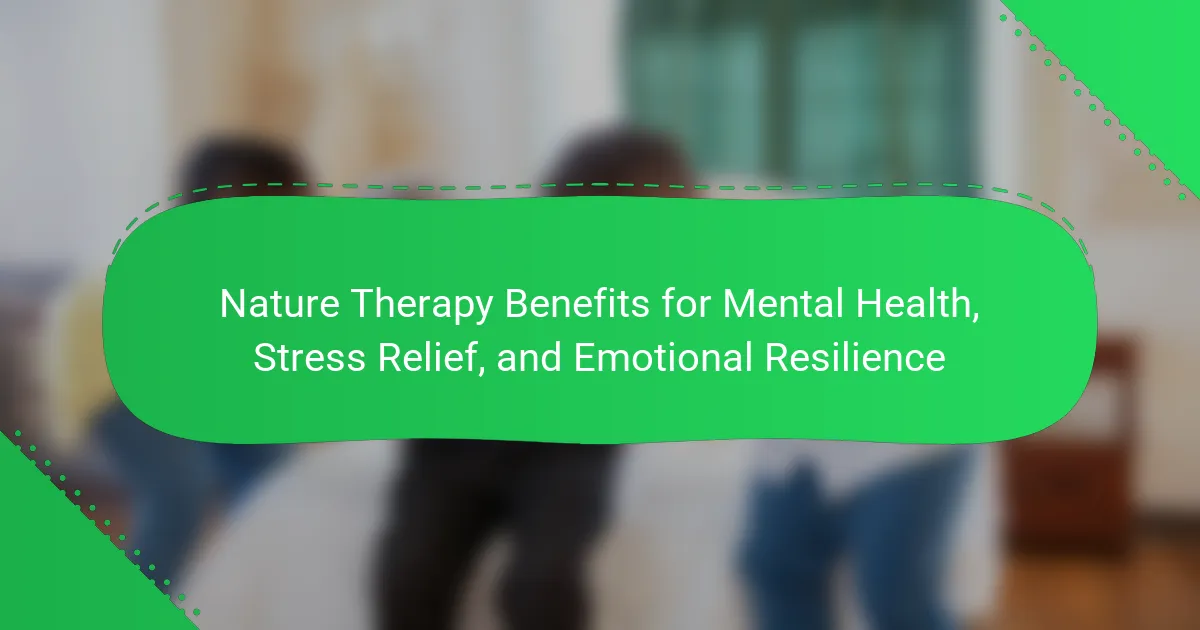Nature therapy offers significant benefits for mental health, including stress relief and enhanced emotional resilience. Engaging with nature can reduce anxiety and depression symptoms, promote mindfulness, and improve overall well-being. Key practices like forest bathing, gardening, and nature walks provide therapeutic effects, while longer sessions in natural environments yield greater psychological benefits. Incorporating nature therapy into daily routines can lead to improved mental health and emotional stability.

What are the key benefits of nature therapy for mental health?
Nature therapy significantly enhances mental health by reducing stress, improving emotional resilience, and fostering overall well-being. Engaging with nature lowers cortisol levels, promotes relaxation, and boosts mood. Studies show that spending time outdoors can lead to a 30% reduction in anxiety and depression symptoms. Nature therapy also encourages mindfulness, allowing individuals to connect with their surroundings, which can improve focus and clarity. Additionally, social interactions in natural settings can strengthen relationships, further enhancing emotional support.
How does nature therapy impact stress relief?
Nature therapy significantly reduces stress by promoting relaxation and enhancing emotional resilience. Engaging with natural environments lowers cortisol levels, which are linked to stress. Studies indicate that spending time in nature can improve mood and decrease anxiety, fostering a sense of well-being. Nature therapy also encourages mindfulness, allowing individuals to focus on the present moment, which further alleviates stress.
What role does nature play in enhancing emotional resilience?
Nature significantly enhances emotional resilience by providing calming environments and promoting mindfulness. Exposure to natural settings reduces stress hormones, leading to improved mood and mental clarity. Studies show that spending time in nature can lower anxiety levels and increase feelings of well-being. Engaging with nature fosters a sense of connection and belonging, which are crucial for emotional stability.

Which scientific studies support the effectiveness of nature therapy?
Numerous scientific studies support the effectiveness of nature therapy for mental health, stress relief, and emotional resilience. Research indicates that exposure to natural environments significantly reduces stress levels and enhances mood. For instance, a study published in the Journal of Environmental Psychology found that participants who engaged in nature walks reported lower levels of anxiety and improved emotional well-being. Another study in the International Journal of Environmental Research and Public Health demonstrated that nature therapy can lead to increased feelings of connectedness and improved overall mental health. Additionally, a meta-analysis in the journal Health & Place concluded that interaction with nature positively influences psychological health, promoting resilience against stressors.
What specific mental health conditions can be alleviated through nature therapy?
Nature therapy can alleviate anxiety, depression, PTSD, and stress-related disorders. Engaging with nature promotes emotional resilience and reduces symptoms of these mental health conditions. Studies indicate that exposure to natural environments enhances mood and cognitive function. For example, individuals with anxiety often report significant improvements in their mental state after nature therapy sessions.
How do different cultures perceive the benefits of nature therapy?
Different cultures recognize nature therapy as beneficial for mental health, stress relief, and emotional resilience. For instance, in Japan, the practice of “Shinrin-yoku” or forest bathing emphasizes immersion in nature to reduce stress and improve mood. In Scandinavian countries, “friluftsliv” promotes outdoor living, enhancing emotional well-being through connection with nature. Indigenous cultures often view nature as a healing force, integrating it into their spiritual practices. Research indicates that exposure to natural environments can lower cortisol levels and enhance overall mental health. These diverse perceptions underscore the universal value of nature therapy across cultures.

What are the most effective forms of nature therapy for individuals?
Nature therapy effectively enhances mental health, reduces stress, and builds emotional resilience. Key forms include forest bathing, gardening, nature walks, and animal-assisted therapy.
Forest bathing, or Shinrin-yoku, immerses individuals in nature, promoting relaxation and reducing cortisol levels. Studies show it can lower anxiety and improve mood significantly.
Gardening provides therapeutic benefits through physical activity and mindfulness. Engaging with plants fosters a sense of accomplishment and connection to nature.
Nature walks encourage physical exercise and exposure to natural environments, which can elevate mood and boost cognitive function. Regular walks in green spaces are linked to enhanced emotional well-being.
Animal-assisted therapy, involving interactions with animals, offers emotional support and companionship. This form of therapy can reduce feelings of loneliness and anxiety, contributing to improved mental health.
How can outdoor activities enhance the therapeutic effects of nature?
Outdoor activities significantly enhance the therapeutic effects of nature by promoting mental health, reducing stress, and building emotional resilience. Engaging in activities like hiking or gardening exposes individuals to natural settings, which studies show can lower cortisol levels and improve mood. Nature therapy encourages mindfulness, allowing participants to connect deeply with their surroundings. This connection fosters a sense of belonging and reduces feelings of isolation. Additionally, physical activity in nature can improve cognitive function and increase overall well-being.
Which nature-based practices are most popular in various regions?
Nature-based practices popular in various regions include forest bathing in Japan, ecotherapy in the UK, and nature walks in the US. These practices enhance mental health, promote stress relief, and build emotional resilience. In Scandinavia, friluftsliv emphasizes outdoor living, while in Australia, bush therapy connects individuals with natural landscapes. Each practice leverages specific environmental attributes to foster well-being.

How does the duration of nature therapy sessions influence outcomes?
Longer nature therapy sessions typically lead to improved mental health outcomes. Research indicates that duration influences stress relief and emotional resilience. Extended sessions allow deeper immersion in natural environments, fostering greater psychological benefits. For instance, a study found that participants in sessions lasting over two hours reported enhanced mood and reduced anxiety compared to shorter sessions. This highlights the value of time spent in nature for maximizing therapeutic effects.
What is the recommended frequency of nature therapy for optimal benefits?
For optimal benefits, nature therapy is recommended at least once a week. Regular engagement promotes mental health, reduces stress, and enhances emotional resilience. Studies indicate that spending two hours in nature weekly significantly improves well-being. Consistency in exposure to natural environments fosters lasting positive effects.
How does seasonal variation affect nature therapy effectiveness?
Seasonal variation significantly impacts the effectiveness of nature therapy. Different seasons offer unique environmental stimuli that can enhance mental health benefits, stress relief, and emotional resilience.
In spring, blooming flowers and warmer temperatures can elevate mood and encourage outdoor activities. Summer provides abundant sunlight, which boosts serotonin levels, promoting happiness. Autumn’s vibrant foliage can inspire mindfulness and reflection, while winter’s serene landscapes may foster introspection and calmness.
Research shows that exposure to nature during these seasonal changes can lead to improved mental health outcomes. For example, a study found that individuals engaging in nature therapy during spring reported a 30% increase in emotional well-being compared to winter sessions.
Overall, aligning nature therapy practices with seasonal variations can optimize their benefits, making the experience more impactful and tailored to individual needs.

What unique attributes of nature therapy differentiate it from other therapeutic practices?
Nature therapy uniquely emphasizes direct interaction with natural environments, promoting mental health through immersive experiences. This practice fosters emotional resilience by leveraging nature’s calming effects, which differ from conventional therapies that often rely on structured sessions. The unique attribute of nature therapy lies in its ability to reduce stress by engaging the senses in a natural setting, providing a holistic approach to mental well-being. Additionally, nature therapy encourages mindfulness and connection to the environment, enhancing emotional stability in ways that traditional therapies may not achieve.
How do personal experiences shape the effectiveness of nature therapy?
Personal experiences significantly enhance the effectiveness of nature therapy. Individual backgrounds influence emotional responses and engagement with natural environments. Personal memories associated with nature can evoke feelings of peace, nostalgia, or joy, reinforcing therapeutic benefits. For instance, someone who enjoyed outdoor activities in childhood may find greater relief from stress in similar settings. Additionally, unique attributes like personal trauma or mental health history shape how one interacts with nature, affecting outcomes. Tailoring nature therapy to these experiences can optimize mental health benefits, stress relief, and emotional resilience.
What rare environmental factors can enhance nature therapy outcomes?
Rare environmental factors that enhance nature therapy outcomes include biodiversity, natural soundscapes, and specific microclimates. Biodiversity enriches the sensory experience, promoting mental engagement. Natural soundscapes, such as birdsong or flowing water, can reduce stress and improve mood. Unique microclimates, like those found in shaded forest areas, may enhance relaxation and comfort, leading to more effective therapy sessions. These elements contribute to the overall effectiveness of nature therapy in supporting mental health, stress relief, and emotional resilience.

What practical steps can individuals take to incorporate nature therapy into their lives?
Individuals can incorporate nature therapy into their lives through simple, practical steps. Spending time outdoors, such as walking in parks or hiking, enhances mental health and reduces stress. Engaging in gardening fosters emotional resilience and connection to nature. Mindfulness practices, like meditation in natural settings, promote relaxation and clarity. Establishing a routine that includes outdoor activities can significantly improve overall well-being.
What are the best practices for maximizing the benefits of nature therapy?
To maximize the benefits of nature therapy, engage regularly with natural environments, practice mindfulness during outdoor activities, and incorporate physical movement.
1. Schedule regular nature walks or hikes to enhance mood and reduce stress.
2. Practice mindfulness by focusing on sensory experiences, such as sounds and smells.
3. Combine physical activity with nature exposure for improved emotional resilience.
4. Create a nature-friendly space at home to encourage daily connection with the outdoors.
What common mistakes should be avoided when engaging in nature therapy?
To engage in nature therapy effectively, avoid common mistakes such as neglecting preparation, setting unrealistic expectations, and ignoring personal limits. Failing to plan can lead to unproductive experiences, while unrealistic goals may cause disappointment. Additionally, pushing beyond comfort can lead to stress instead of relief. Embrace gradual exposure to nature for better mental health benefits.
